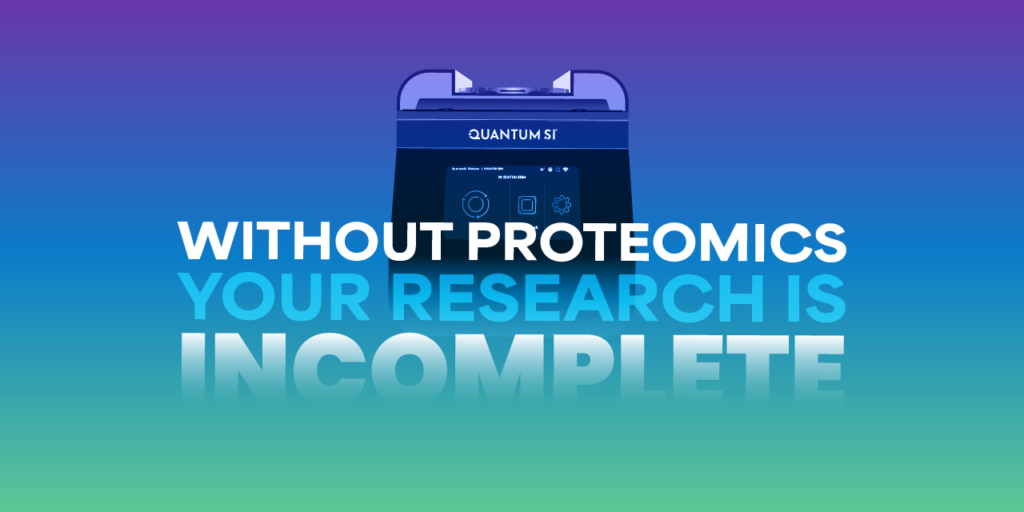Next-Generation Protein Sequencing™: The Next Big Thing in Genomics
July 22, 2024 • Brian Reed, PhD

By Brian Reed, PhD, Head of Research
At the Festival of Genomics meeting held earlier this summer, Dr. Gloria Sheynkman, Assistant Professor at the University of Virginia, captivated a full audience with her presentation on the use of Next-Generation Protein Sequencing™ (NGPS) on the Quantum-Si Platinum® instrument to detect disease-relevant proteoforms. This significant interest in proteomics at a genomics conference highlights the growing intersection of these fields.
The QSI team has been actively engaging with the genomics community to emphasize the importance of proteomics and NGPS. Our Head of Research, Brian Reed, PhD, recently spoke at the European Society of Human Genetics about the expanding role of NGPS in advancing biological research, enabling researchers to sequence proteins within their own laboratories.
Why Proteomics and NGPS?
Proteins play pivotal roles in biological functions, acting as crucial indicators and therapeutic targets for diseases. Changes in proteins drastically influence their function, making it crucial to have accessible technology that can detect single amino acid variations, post-translational modifications, and protein truncations or fusions. These variations often stem from events happening at the transcript level. However, sophisticated and accessible methods for studying the complexity of the proteome have been lacking.
Next-generation DNA sequencing has been transformative, revolutionizing our understanding of biology and enabling groundbreaking discoveries. It facilitated genome-wide association studies, RNA-Seq, and metagenomics. Many of these studies result in lists of genes or proteins that show interesting patterns. However, a gap has remained in validating this data at the functional level, determining what these genes actually do and what drives a particular phenotype.
In some cases, researchers have access to mass spectrometry facilities and the necessary expertise to conduct these studies. In other cases, they rely on decades-old technologies like SDS-PAGE and Western blots, which can be messy, tedious, and inaccurate.
Bridging the Gap with NGPS
Advances in protein analysis haven’t kept pace with advances in DNA sequencing. Until now. NGPS offers researchers in the genomics field an accessible, sophisticated method to interrogate proteins and proteoforms. You can generate enormous quantities of data with next-generation DNA sequencing — NGPS takes it further.
NGPS enables the identification of unknown proteins that are critical to biology. Whether you have a biological sample and want to know what proteins are present, or you’ve identified a critical protein in a pathway and want to know what other proteins are bound to it, NGPS can help. It’s particularly useful for understanding single amino acid variations, post-translational modifications, and other complex protein characteristics that are especially difficult to analyze with mass spectrometry or antibody-based techniques.
Dr. Sheynkman’s Pioneering Work
Dr. Sheynkman’s presentation at the Festival of Genomics showcased the potential of NGPS. Her team is using advanced analytical and computational approaches to identify and understand how proteomic variation underlies human disease and to capture alternative splicing variants. They aim to discover novel disease proteoforms, assay their specific functions, and elucidate the molecular mechanisms by which proteoforms influence cellular networks and drive disease states.
In her presentation, Dr. Sheynkman described creating a database for long-read-guided interpretation of protein isoforms and mapping splicing events related to bone mineral density in human fetal osteoblast (hFOB) cell lines. Using this approach, her lab identified actin-binding tropomyosin (TPM1/2)-informative peptides and TPM2 isoform-informative peptides, then utilized the Quantum-Si Platinum instrument to differentiate synthetic peptides corresponding to TPM1/2 paralogs and spliceoforms. This integration of single-molecule sequencing and orthogonal methods advances proteogenomics, facilitating the transition from discovery to proteoform scoring.
Take the Leap into Proteomics!
Proteins are the effector molecules carrying out the functional tasks in the cell, and their levels and modifications change over time. Because of the dynamic nature of proteins, genomic and transcriptomic data outputs cannot report accurately on the abundance and types of proteoforms present in the cell. Understanding these dynamics is crucial for advancing biological research and therapeutic development. NGPS on the Quantum-Si Platinum platform offers researchers the tools to uncover these intricate details, driving innovation in genomics and proteomics.
If you are a genomics researcher, we encourage you to explore how NGPS can add a new dimension to your studies. Contact us today for a demo of the Quantum-Si Platinum instrument and to discuss your specific applications.
Brian Reed, PhD, Head of Research
Brian Reed, PhD, is a distinguished scientist and the Head of Research at Quantum-Si, where he has been at the forefront of groundbreaking advancements. Dr. Reed is part of the team that developed Quantum-Si’s Platinum platform which includes the world’s first Next-Generation Protein Sequencing instrument.
Dr. Reed joined Quantum-Si in June 2014, assuming the role of Principal Scientist, and was elevated to Head of Research in August 2019. Prior to Quantum-Si, Dr. Reed was a Senior Staff Scientist and Group Leader at Ion Torrent’s Life Technologies.
He earned his Bachelor of Arts in Biology at Harvard University and went on to earn his PhD in Molecular Biology from Yale University.